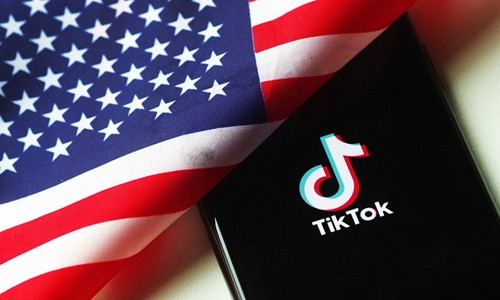
TikTok US Photo: VCG
Disinformation by some US politicians regarding Chinese companies, hyping the so-called risks to the US "national security", will fail to achieve their goals as the relentless crackdown won't hinder the demand of America consumers for Chinese goods and services, experts told the Global Times.
The comment came after FBI Director Chris Wray warned on Friday that control of TikTok, the popular Chinese video-sharing app, is "in the hands of the Chinese government".
Wray said the FBI was concerned that the Chinese had the ability to control the app's recommendation algorithm, "which allows them to manipulate content, and if they want to, to use it for influence operations." He also asserted that China could use the app to collect data on its users that could be used for traditional espionage operations, according to a report by the Associated Press.
Wray made the remarks at the University of Michigan's Gerald R. Ford School of Public Policy. It was not the first time that he had raised national security concerns about TikTok. He made similar comments about three weeks ago when addressing US lawmakers.
Spreading disinformation and using it to suppress Chinese firms has become a common practice of the US, Mao Ning, a spokesperson for China's Foreign Ministry, said in response on November 16.
Mao noted that China firmly opposes those comments, and urges the US to take a more responsible and practical approach, and abide by fair, open and non-discriminatory international rules.
Pan Helin, co-director of the Research Center for Digital Economics and Financial Innovation at Zhejiang University, told the Global Times on Monday that American politicians failed to achieve their goal of suppressing Tik Tok because ordinary people like the app.
"In the direct-to-consumer field, American politicians do not have much influence. Politicians who have failed to achieve their goals but only attract attention through hyping topics about China and Chinese firms are doomed to fail.
"China's products, services and digital economy are attractive to the American people, so there is no need to care too much about the behavior of some US politicians," said Pan.
In 2020, then US president Donald Trump issued an executive order to ban TikTok's operations in the country, citing "national security concerns." Later, the company took legal action against the order.
The US government's Committee on Foreign Investment in the US (CFIUS), which reviews US acquisitions by foreign acquirers for potential national security risks, in 2020 ordered ByteDance, the Chinese company that owns TikTok, to divest the unit. CFIUS and TikTok have been in talks for months aiming to reach an agreement to protect the data of TikTok's more than 100 million users.
After Joe Biden took office, he revoked the Trump directive in 2021, asking the Treasury Department to examine "security concerns" associated with the app.
TikTok has again become the highest-grossing app in the world even as the overall market is seeing a slight decline. TikTok's global app along with Douyin, its sister app, retained the position as the top-grossing non-game app across the App Store and Google Play combined, with approximately $914.4 million in consumer spending in the third quarter, according to a report by Sense Tower.
Global Times




